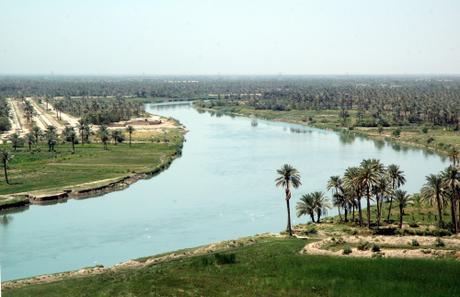
“Now a river flowed out of Eden to water the garden; and from there it divided and became four rivers” (Genesis 2:10)
Where was the Garden of Eden located? Today we are unable to pinpoint the exact location of it. We cannot be certain of the specific spot where it was. It is likely from the description given that it was somewhere in the Tigris and Euphrates Valley. No parameters are given concerning its size, perhaps it filled that entire valley. We may not be able to identify its precise site, but we can determine that the Garden is presented as an actual place.
That the Garden of Eden was not a symbolic or mythological paradise can be seen by the fact that specific landmarks are given in relation to its locale. Genesis 2:10-14 names four rivers which flowed out from a single source that originated in the Garden. The rivers are given by name and we are told about the lands into which they flowed. It would seem unlikely that Moses would provide such specific details if he were writing about a fictional place.
It would stand to reason, then, that since the Garden itself was an actual place, the events and objects mentioned in connection with it would be real and literal, as well. There is no Biblical basis for concluding that the Tree of the Knowledge of Good and Evil and the fruit which grew upon it were mythical or metaphorical, nor is there any support in Scripture that would suggest that Adam and Eve were not actual people who literally ate thereof. Eden is directly referred to by writers such as Isaiah, Ezekiel, and Joel while Adam is specifically mentioned in 1 Chronicles, Job, Luke, Jude, and throughout Paul’s Epistles. It seems that the future writers of Scripture took Moses at his word and believed the literalness of his account, maybe we would be wise to do the same.
The reason that some have suggested that the events and places described in the first few chapters of the Book of Genesis are not literal is not because the principles of sound Biblical analysis and the fundamentals of Scriptural exegesis have led them to such conclusions, but rather because of their own personal distaste for the supernatural. They feel embarrassed by the fantastic nature of the narrative and therefore seek to marginalize it in order to retain the appearance of intellectualism and sophistication. They take a similar approach in the New Testament when it comes to the miracles of the Lord Jesus Christ.
The problem with taking this approach to interpreting the Bible is, where do you draw the line? Once you reject one thing because it doesn’t appeal to you, it’s easy to reject other things. If you are going to wince at the believability of the first three chapters of the Bible, how are you going to accept the ones that follow? You simply cannot embrace John 3:16 and Romans 10:9 while rejecting Genesis 3:4-6. You either believe the Word of God or you do not. God has not given us the privilege of deciding which portions of His Word we like and which ones we don’t.
To Jesus Christ goes all glory. In service to Him,
Loren
[This post was originally published August 9, 2009]
**Unless otherwise indicated, all Scripture quotations are taken from the New American Standard Bible (NASB) © The Lockman Foundation and are used by permission.
[If you do not know the Lord Jesus Christ or you are not certain where you are headed when this life ends, I invite you to read the article “Am I Going To Heaven?“]
Advertisements